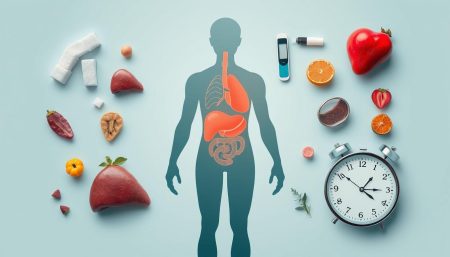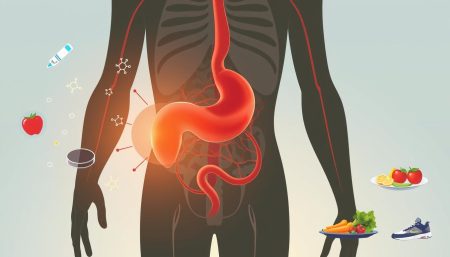The etiology of diabetes mellitus type 2 is complex and challenging. It goes beyond just lifestyle choices. It involves genetics, environment, and mental health too. As we explore the causes of diabetes mellitus type 2, we face a growing health crisis worldwide.
We will look into the roots of this common disease. We’ll examine everything from cells to society. Understanding type 2 diabetes is urgent. Its rise affects health and economies globally.
Understanding Type 2 Diabetes Mellitus
Type 2 diabetes mellitus is a long-term condition that affects millions worldwide. It is caused by high blood sugar levels, often due to insulin resistance or not enough insulin. This section explores what type 2 diabetes is and its prevalence and importance as a health issue.
Defining Diabetes Mellitus Type 2
Type 2 diabetes is the most common form of diabetes. It happens when your body either doesn’t respond well to insulin or doesn’t make enough insulin. Unlike type 1 diabetes, which is usually present from birth and requires insulin, type 2 develops over years. It’s often linked to lifestyle factors like being overweight and not being active enough.
Prevalence and Public Health Concern
The prevalence of type 2 diabetes is growing worldwide, making it a big health problem. It’s not just common; it also leads to serious health issues like heart disease, nerve damage, kidney failure, and blindness. Understanding these issues is key to addressing them and managing the condition.
| Country | Approximate Prevalence | Projected Growth by 2025 |
|---|---|---|
| USA | 10.5% | 15% |
| India | 7.8% | 10.4% |
| China | 10.9% | 12% |
Etiology of Diabetes Mellitus Type 2
The causes of factors contributing to Type 2 Diabetes are complex. They involve genetics, lifestyle, and the environment. Knowing how these factors work together is key to understanding Type 2 Diabetes risk.
- Genetic susceptibility: Some genes make it more likely to get Type 2 Diabetes.
- Lifestyle choices: Diet, exercise, and weight also play big roles in risk.
- Environmental influences: Exposure to toxins and viruses can increase risk too.
Each area has specific risk factors for Type 2 Diabetes. These can either cause the disease or increase its chance. Studying these factors is essential for preventing Type 2 Diabetes.
Unveiling the Pathogenesis of Type 2 Diabetes
Type 2 diabetes is complex, with insulin resistance and β-cell dysfunction at its core. These factors work together to speed up the disease’s progression. It’s vital to understand each role deeply.
The Role of Insulin Resistance
Insulin resistance is key in type 2 diabetes. It makes the body less responsive to insulin. This leads to more insulin production, which can harm the pancreas over time.
This connection shows why early treatment is so important. It helps prevent the disease from getting worse.
β-Cell Dysfunction in Type 2 Diabetes
β-cells in the pancreas are vital for insulin production. But, they struggle due to insulin resistance. This makes them less effective and reduces their number.
This decline in β-cell function is a major factor in type 2 diabetes. It results in not enough insulin to control blood sugar levels.
Understanding these processes is key to finding better treatments. Research shows that improving insulin sensitivity and β-cell health can change the disease’s course. This offers new hope for managing type 2 diabetes.
Genetic Predisposition to Type 2 Diabetes
The genetic predisposition to Type 2 diabetes plays a big role in the disease. Many genes are linked to the risk of getting this chronic condition. These genes affect how the body uses insulin, helping us understand who might be at risk.
People with a family history of Type 2 diabetes often carry genes that increase their risk. While lifestyle and environment also play a part, genetics are the starting point.
| Gene | Function | Impact on Diabetes Risk |
|---|---|---|
| TCF7L2 | Glucose homeostasis | Highly associated with increased diabetes risk |
| PPARG | Regulation of fatty acid storage and glucose metabolism | Moderate association with diabetes risk |
| SLC30A8 | Zinc transporter in beta cells | Contributes to insulin secretion |
Knowing about the genetic predisposition to Type 2 diabetes is key. It shows why genetic testing is important for those with a family history. This knowledge helps in early detection and in creating prevention plans that fit each person’s genetic profile.
Lifestyle Factors and Their Impact on Type 2 Diabetes
The link between lifestyle and type 2 diabetes is clear. What we eat and how much we move are key. These choices affect our risk of getting diabetes, focusing on diet and exercise.
Dietary Influences on Diabetes Risk
Our diet plays a big role in getting type 2 diabetes. Eating too much sugar and processed foods raises our risk. This can lead to obesity, a major cause of diabetes.
On the other hand, eating foods high in fiber, lean proteins, and healthy fats can help. It can manage or delay diabetes symptoms.
Physical Inactivity As a Major Contributor
Not moving enough is another big risk for type 2 diabetes. Exercise improves how our body uses insulin. It helps manage weight, improves mood, and lowers blood sugar.
| Factor | Impact on Type 2 Diabetes |
|---|---|
| High sugar diet | Increases blood glucose levels, leading to insulin resistance |
| Processed foods | Contributes to obesity, a major risk factor |
| Fiber-rich diet | Helps regulate blood sugar levels |
| Physical inactivity | Decreases insulin sensitivity, increasing disease severity over time |
Lifestyle choices have a big impact on type 2 diabetes risk and management. Eating well and staying active can lower these risks. This shows how important it is to live a healthy lifestyle.
The Interplay of Obesity and Type 2 Diabetes
The obesity and type 2 diabetes correlation is a key area in medical science today. It’s important to know how extra body weight leads to type 2 diabetes. This knowledge helps in preventing and managing the disease.
Abdominal fat plays a big role in this connection. It affects not just looks but also how our body works. More belly fat means our body can’t use insulin well. This is a big problem in type 2 diabetes.
Looking for ways to treat and manage this issue has led to new ideas. For example, Ozempic, made for diabetes, is now used for weight loss too.
| Factor | Impact on Insulin Sensitivity | Impact on Type 2 Diabetes Risk |
|---|---|---|
| Excess Body Weight | Decreases insulin sensitivity | Increases risk significantly |
| Abdominal Adiposity | Highly decreases insulin sensitivity | Greatly increases risk |
| Regular Physical Activity | Increases insulin sensitivity | Lowers risk |
It’s vital to see obesity as a major predictor of type 2 diabetes. By tackling risk factors through lifestyle changes and medical help, we can lower the chance of getting type 2 diabetes.
Insulin Resistance and Type 2 Diabetes
It’s important to understand how insulin resistance and Type 2 diabetes are connected. This connection is key in the fight against this chronic disease. Insulin resistance plays a big role in developing diabetes, affecting prevention and management.
Mechanisms Leading to Insulin Resistance
Insulin resistance is caused by a mix of genetic and environmental factors. These factors make it hard for the body to use insulin well. At the cell level, problems with insulin signaling pathways reduce glucose uptake, leading to high blood sugar.
Too much fat and chronic inflammation also contribute to insulin resistance. These factors are important to consider in preventing and managing the condition.
Identifying Insulin Resistance in Individuals
Accurate diagnosis of insulin resistance is key for early treatment. Several tests are used, like the glucose tolerance test. This test checks how well the body handles glucose over time.
The HbA1c test is also important. It shows the average blood sugar level over three months. This helps in managing glucose levels over the long term.
| Diagnostic Tool | Description | Utilization |
|---|---|---|
| Glucose Tolerance Test | Measures glucose levels after a sugar load | Ideal for early screening of insulin resistance in high-risk populations |
| HbA1c Test | Gives a three-month average of blood glucose levels | Used for monitoring long-term glucose management in established diabetic patients |
Understanding insulin resistance and improving diagnosis is vital. It helps in reducing the number of people with Type 2 diabetes.
Understanding How Metabolic Syndrome Relates to Diabetes Type 2
Metabolic syndrome is a group of health issues. These include high blood pressure, high blood sugar, and too much body fat around the waist. It also includes abnormal cholesterol levels. Together, they raise the risk of getting diabetes type 2.
This connection is key. It shows how we can prevent more cases of diabetes worldwide.
Metabolic syndrome makes it twice as likely to get diabetes type 2. Knowing the signs of metabolic syndrome is vital. Early action can slow down the move towards diabetes.
- Abdominal obesity as evidenced by waist circumference (ethnicity specific measurements).
- Triglyceride levels equal to or higher than 150 mg/dL.
- Reduced HDL cholesterol, less than 40 mg/dL in men and less than 50 mg/dL in women.
- Blood pressure levels of 130/85 mmHg or higher.
- Fasting glucose levels of 100 mg/dL or higher.
Many studies show metabolic syndrome’s link to diabetes type 2. Spotting and handling these signs can stop diabetes and other health issues. The table below shows how different parts of metabolic syndrome raise diabetes risk.
| Component | Risk Factor | Impact on Diabetes Type 2 Development |
|---|---|---|
| High Waist Circumference | Central Obesity | Increase in insulin resistance |
| High Triglycerides | Lipid Imbalance | Interferes with glucose metabolism |
| Low HDL Cholesterol | Poor Lipid Profile | Inhibits hormonal balance critical for insulin activity |
| High Blood Pressure | Cardiovascular Strain | Contributes to overall body stress and insulin inefficacy |
| High Fasting Glucose | Pre-diabetes Indicator | Direct precursor to diabetes type 2 |
Managing metabolic syndrome needs a few steps. These include changing your diet, exercising regularly, and sometimes, medical help. This approach not only controls the syndrome but also lowers diabetes type 2 risk.
Environmental Factors Contributing to Type 2 Diabetes
Type 2 diabetes is becoming more common, linked to environmental factors. Urban living and chemicals called endocrine disruptors play big roles. Understanding these can help prevent the disease.
The Influence of Urbanization
Urban living affects our health, making us less active. The ease of getting around and sitting at desks all day lowers our activity. This leads to more cases of type 2 diabetes.
Endocrine Disruptors and Their Possible Effects
Some chemicals in cities can mess with our hormones. These endocrine disruptors might make diabetes worse or even cause it. They can change how our bodies use insulin.
| Factor | Impact on Type 2 Diabetes |
|---|---|
| Urbanization | Encourages sedentary lifestyles; reduces physical activity |
| Endocrine Disruptors | May increase insulin resistance, influencing diabetes onset |
Risk Factors for Type 2 Diabetes: A Closer Look
Exploring detailed risk factors for diabetes type 2 is key. We look at both known and new factors that can change risk levels. This includes genetics, lifestyle, and where you live, all affecting type 2 diabetes.
Genetic Factors: A family history of diabetes increases your risk. Knowing your genetic background is vital for understanding your risk for type 2 diabetes.
Lifestyle Choices: Bad eating habits, not enough exercise, and smoking also raise your risk. These are things you can change to lower your risk of getting type 2 diabetes.
| Factor | Description | Impact Level |
|---|---|---|
| Obesity | Too much fat, mainly around the waist. | High |
| Sedentary Lifestyle | Not moving enough. | Medium |
| Age | Risk goes up after 45. | Medium |
| High Blood Pressure | Always having high blood pressure. | Medium |
| Poor Diet | Eating too much processed food and sugar. | High |
Socio-economic status and ethnicity also play big roles in detailed risk factors for diabetes type 2. Some groups, like Hispanics, African Americans, and Native Americans, face a higher risk.
Knowing these factors helps with personal health and guides policy makers. They can make plans to fight the global diabetes problem.
Psychosocial Stressors and Their Role in Type 2 Diabetes Etiology
Looking into how stress and type 2 diabetes are linked shows us a lot. It shows how mental stress can mess with how our body handles sugar. This mix of stress effects and sugar levels makes managing diabetes hard, even harder when mental health is involved.
Stress-Induced Glucose Dysregulation
Stress affects sugar levels in a few ways. When we’re stressed, our body makes more cortisol and adrenaline. These hormones can raise blood sugar. So, long-term stress might lead to higher sugar levels, which could cause type 2 diabetes.
The Burden of Mental Health on Diabetes Management
The link between mental health and diabetes control is strong. Stress, like anxiety and depression, makes it tough to keep diabetes in check. These mental health issues can make it hard to keep blood sugar levels right.
| Impact Factor | Effect on Glucose Levels | Role in Diabetes Management |
|---|---|---|
| Chronic Stress | Increases Cortisol, High Glucose | Requires More Rigorous Monitoring |
| Mental Health Issues | Can Lead to Neglected Self-care | Complicates Consistent Management |
| Coping Mechanisms | Varies, Potentially Beneficial | Essential for Long-term Control |
The Impact of Age and Ethnicity on Type 2 Diabetes
It’s important to understand how age-related diabetes risk and ethnicity and diabetes prevalence affect Type 2 Diabetes. This knowledge helps in creating better healthcare plans. We will explore how age and ethnicity impact this widespread disease.
As people get older, the chance of getting Type 2 Diabetes goes up. This is because the body gets worse at handling insulin as we age. Also, ethnicity and diabetes prevalence show big differences. This shows how genetics and environment play a role in who gets the disease.
- The risk of diabetes goes up with age, showing why starting healthy habits early is key.
- Healthcare needs to focus more on ethnic groups at higher risk to help them better.
| Age Group | Diabetes Prevalence (%) |
|---|---|
| 18-44 | 4.2 |
| 45-64 | 17.5 |
| 65+ | 26.8 |
Ethnicity and diabetes prevalence show clear differences. Native Americans, African Americans, and Hispanic Americans face higher risks than Caucasians. This information is vital for making diabetes prevention and management plans.
- Starting health programs in communities to teach about diet and exercise for at-risk ages.
- Increasing screenings in high-risk ethnic groups to catch diabetes early.
To fight age-related diabetes risk and the different rates of diabetes in various ethnic groups, we need a broad strategy. This should include educating patients, supporting communities, and making healthcare policies that fit the needs of different groups.
Gestational Diabetes and Its Role in Future Type 2 Diabetes
Looking into the links between gestational diabetes and its long-term effects is very interesting. It shows how it affects both mom and baby’s health. This condition can lead to a higher risk of type 2 diabetes for both in the future.
By studying fetal programming and diabetes and the gestational diabetes impact, we learn a lot. This knowledge helps us understand and prevent these problems.
Fetal Programming of Type 2 Diabetes
The womb environment can influence disease risk later in life. When a mom has gestational diabetes, her baby is more likely to face metabolic issues. This includes a higher chance of getting type 2 diabetes.
This shows why managing gestational diabetes is so important. It helps prevent bad effects on the baby’s health.
Intergenerational Effects of Gestational Diabetes
Gestational diabetes can affect not just the mom and baby but also future generations. Studies show that diabetes risk can pass from parent to child. This is due to both genetics and environmental factors.
This highlights the need for health strategies that look at the whole family. It’s not just about treating the individual but also their family history.
In conclusion, tackling gestational diabetes early on can greatly reduce the risk of type 2 diabetes. This is true for those directly affected and for their children and grandchildren. It’s a call to action for better care and lifestyle changes to break the cycle of disease.
Hormonal Disorders and Secondary Diabetes
It’s key to know how hormonal imbalances and diabetes are linked. This helps us spot secondary diabetes causes. Conditions like Cushing’s syndrome and polycystic ovary syndrome (PCOS) raise the risk of secondary diabetes. They mess with the hormones needed to control blood sugar.
Cushing’s syndrome makes too much cortisol. This leads to more glucose in the liver and less use by cells. It also makes insulin less effective, raising blood sugar.
PCOS is linked to insulin resistance, a big factor in type 2 diabetes. This shows a strong connection between hormonal imbalances and diabetes.
| Hormonal Disorder | Impact on Insulin | Resultant Effect on Glucose Levels |
|---|---|---|
| Cushing’s Syndrome | Decreases insulin sensitivity | Increases blood glucose levels |
| PCOS | Reduces glucose uptake | High blood glucose predisposing to diabetes |
| Acromegaly | Impairs insulin secretion | Elevates blood glucose |
| Hyperthyroidism | Accelerates glucose synthesis | Higher fasting glucose levels |
Understanding how these disorders lead to secondary diabetes causes can help us better manage them. By controlling these hormonal issues, we can lower the risk or slow down diabetes. This shows how important hormonal balance is for our metabolic health.
Pharmacological Agents and Risk of Developing Type 2 Diabetes
Some medicines can raise the risk of getting type 2 diabetes. Knowing which drugs can cause this is key. It helps in managing side effects from medications.
Drugs That Potentially Increase Diabetes Risk
Many common medicines have been linked to a higher risk of diabetes. This includes some diuretics, anti-hypertensives, and statins. Doctors need to know these risks to decide if the benefits outweigh the side effects.
Monitoring and Managing Medication-Induced Dysglycemia
Managing side effects means checking blood sugar levels often. This is important for those at higher risk. Sometimes, changing the medicine is needed to treat the main condition without causing diabetes.
| Medication Type | Risk Level | Commonly Used For |
|---|---|---|
| Corticosteroids | High | Inflammation Control |
| Beta-Blockers | Medium | Blood Pressure Management |
| Thiazide Diuretics | Medium | Fluid Retention Treatment |
| Antipsychotics | High | Mental Health Disorders |
Identifying high-risk medicines and managing side effects well can reduce diabetes risk. Teaching patients about possible side effects and regular checks are key. This helps in finding the right balance in treatment.
Nutritional Deficiencies and Their Relation to Type 2 Diabetes Onset
The link between nutritional deficiencies and diabetes is getting more attention. Important nutrients help our bodies work right. Without them, we might face health problems like type 2 diabetes. Vitamin D and magnesium are key, helping with insulin and sugar use.
Vitamin D does more than keep bones strong. It helps with insulin and fights inflammation. Magnesium is also vital for insulin use. Studies show low magnesium levels raise diabetes risk. This shows how diet affects diabetes risk.
Healthcare experts and patients should focus on good nutrition to prevent diabetes. Eating well and possibly taking supplements can help. This approach can lower the risk of type 2 diabetes, a big problem worldwide. By eating right, we can control our health and reduce diabetes risk.
FAQ
Q: What is the etiology of diabetes mellitus type 2?
A: Diabetes mellitus type 2 comes from many factors. These include genetics, environment, lifestyle, and body functions. Key causes are insulin resistance, β-cell dysfunction, obesity, and lack of exercise.
Q: How does insulin resistance contribute to type 2 diabetes?
A: Insulin resistance is a main cause of type 2 diabetes. It happens when body cells don’t respond well to insulin. This raises blood sugar levels. Eventually, the pancreas can’t keep up, leading to diabetes.
Q: Can genetics affect your risk of developing type 2 diabetes?
A: Yes, genetics play a big role. Some genes increase the risk. Having a family history also raises your chances.
Q: Are lifestyle factors significant in the onset of type 2 diabetes?
A: Definitely. Lifestyle choices like eating too much sugar and not exercising are big risks. Changing these habits can help prevent and manage diabetes.
Q: What is the relationship between obesity and type 2 diabetes?
A: Obesity, mainly around the belly, is closely linked to type 2 diabetes. Extra fat, like in the belly, makes cells less responsive to insulin. This can lead to diabetes.
Q: What environmental factors contribute to the risk of type 2 diabetes?
A: Environmental factors like living in cities and exposure to harmful chemicals can increase diabetes risk. These can lead to obesity and insulin resistance.
Q: How does metabolic syndrome relate to type 2 diabetes?
A: Metabolic syndrome is a group of conditions. It includes high blood pressure, high blood sugar, and excess belly fat. Together, they raise the risk of heart disease and diabetes.
Q: Are there specific risk factors for type 2 diabetes?
A: Yes, there are specific risks. These include age, family history, ethnicity, and certain health conditions. Lifestyle choices like diet and exercise also play a part.
Q: Can stress influence the development of type 2 diabetes?
A: Yes, chronic stress can harm blood sugar control. It can lead to diabetes. Stress hormones can increase blood sugar and affect insulin function.
Q: What role does age or ethnicity play in type 2 diabetes?
A: Age is a big risk factor. Older people are more likely to develop diabetes due to decreased insulin sensitivity. Some ethnic groups are also at higher risk due to genetics and environment.
Q: How does gestational diabetes impact the risk of developing type 2 diabetes later?
A: Women with gestational diabetes are at higher risk for type 2 diabetes later. It can also affect their children’s health, increasing their risk for diabetes and obesity.
Q: How do hormonal disorders influence diabetes?
A: Hormonal disorders like Cushing’s syndrome and PCOS can cause insulin resistance and high blood sugar. This can lead to diabetes, often called secondary diabetes.
Q: Can medications affect the risk of developing type 2 diabetes?
A: Yes, some medications can increase diabetes risk. These include certain antipsychotics, steroids, and HIV/AIDS drugs. It’s important to watch blood sugar levels when taking these.
Q: Do nutritional deficiencies contribute to type 2 diabetes onset?
A: Nutritional deficiencies, like vitamin D or magnesium, may increase diabetes risk. Eating a balanced diet is key to preventing diabetes.


















